
German postcard by Ross Verlag, Berlin, no. 651/5, sent by mail in 1922. Photo: Cserépy-Film Co. Otto Gebühr and Lilly Flohr in Fridericus Rex (Arzén von Cserépy, 1922-1923).
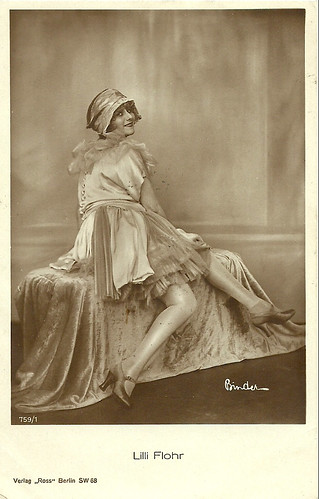
German postcard by Ross Verlag, Berlin, no. 759/1, 1919-1924. Photo: Alex Binder. Collection: Didier Hanson.
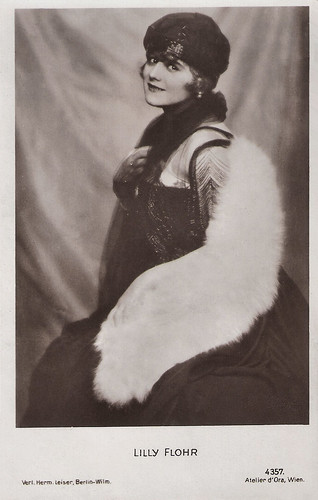
German postcard by Verlag Hermann Leiser, Berlin, no. 4357. Photo: Atelier d'Ora, Wien.
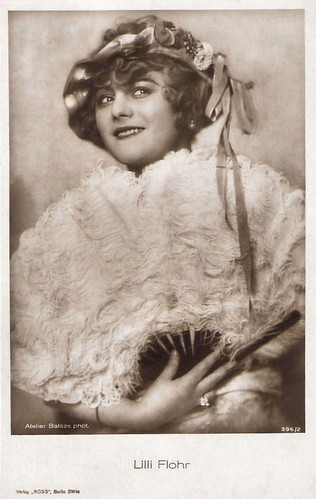
German postcard by Ross Verlag, Berlin, no. 396/2, 1919-1924. Photo: Atelier Balázs.
Total Manoli
Lilly (also written as Lily or Lilli) Flohr was born in 1893 (some sources say 1903) in Wien (Vienna), Austria. She grew up in an artistic environment because her father was a versatile and gifted artist - he worked as an actor, singer, musician and painter.
Lilly had her first appearance at the Raimund Theater in Vienna. Later she became a busy stage actress, soubrette, cabaret artist and chanson singer. In Berlin, she performed from 1917 to 1919 at the famous Berliner Theater where she played the title role in the premiere of Walter Kollo’s operetta Die tolle Komtess (The Crazy Countess) and a year later she had another success in the original production of Kollo’s operetta Blitzblaues Blut (Lightning Blue Blood).
She soon experienced the drawback of the theatre where an actress had to play the same role several hundred times which created a kind of monotony. Then she discovered the film business where an actress could impersonate different roles within a year. Lilly Flohr began her career in the cinema with the comedy Ein Lied von Hass und Liebe/A Song of Hate and Love (Rudolf Walther-Fein, 1918) with Leo Peukert, and Die Erbin/The Heiress (Walter Schmidthässler, 1918).
Then she was cast for the leading role in the film Das Mädchen aus der Ackerstrasse/The Girl from the Ackerstrasse (Reinhold Schünzel, 1919) opposite Otto Gebühr.
In 1920, she returned to the stage in Total Manoli, the first cabaret revue of the Nelson Theatre, with Fritz Grünbaum, Paul Morgan and dancer Anita Berber, which became a popular and even legendary show.

German postcard by Verlag Ross, Berlin, no. 480/1. Photo: Atelier Balazs, Berlin.

German postcard by Verlag Ross, Berlin, no. 480/2. Photo: Atelier Balazs, Berlin.

German postcard by Verlag Ross, Berlin, no. 480/3. Photo: Atelier Balazs, Berlin.
Shanghai, the last hope for Jewish emigrants
In the 1920s, the attractive Lilly Flohr appeared in more successful productions like Das Haus in der Dragonergasse/The House in the Dragonergasse (Richard Oswald, 1921) with Werner Krauß and the sequel Wie das Mädchen aus der Ackerstrasse eine Heimat fand/How the Girl from the Ackerstrasse found a homeland (Martin Hartwig, 1921). The following year, she could be seen in Se. Exzellenz der Revisor/His Excellency the Revisor (Friedrich Zelnik, 1922), Schande/Shame (Siegfried Dessauer, 1922), and the historical epic Fridericus Rex (Arsen von Cserépy, 1922) starring Otto Gebühr.
Later she appeared in the comedy Die Kleine aus der Konfektion/The Little Girl from Confection (Wolfgang Neff, 1925) with Reinhold Schünzel. In 1927 she appeared in the Romanian film Lia (Jean Nihail, 1927) with an all-Romanian cast.
Her last film was Kinder der Strasse/Razzia (Carl Boese, 1928) starring Lissy Arna and Heinrich George. After the introduction of the sound film, she retired from the film business. Flohr could continue her successful stage career for a while. In the early 1930s, she performed at the Metropol-Theater and the Neuen Theater am Zoo and in famous variety theatres as the Scala and the Wintergarten.
She also appeared in Kurt Robitschek’s Kabarett der Komiker. She played the title role in August Strindberg’s Fräulein Julie (Miss Julie) and Polly in Bertold Brecht and Kurt Weill's Die Dreigroschenoper (The Three Penny Opera). Then in 1934, she got a prohibition to work in Nazi Germany because of her Jewish roots.
In 1939, she emigrated to Shanghai where she could continue her stage career with other German-speaking emigrants. Between 1938 and 1941, ca. 18.000 Jews from Germany and Austria emigrated to the Chinese Metropole. A visa was not necessary to enter the country and therefore Shanghai was the last hope for Jewish emigrants. After the war, she moved to Australia and never returned to Europe. Lilly Flohr passed away in 1978 in North Ryde, a suburb of Sydney.
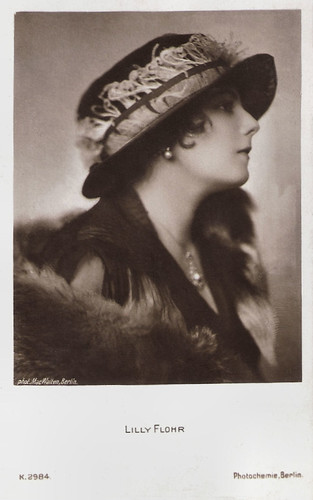
German postcard by Photochemie, Berlin, no. K. 2984. Photo: Mac Walten, Berlin.

German postcard by Photochemie, Berlin, no. K. 2993. Photo: Mac Walten, Berlin.
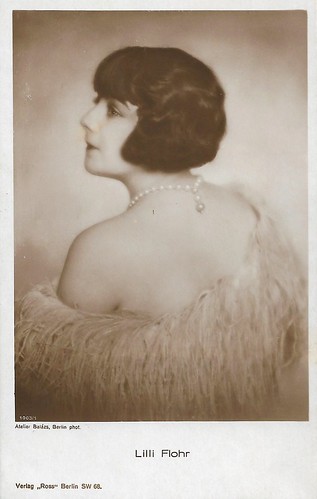
German postcard by Ross Verlag, no. 1003/1, 1927-1928. Photo: Atelier Balázs, Berlin.
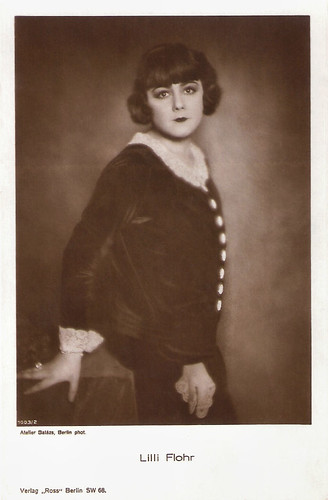
German postcard by Ross Verlag, Berlin, no. 1003/2, 1927-1928. Photo: Atelier Balázs, Berlin.
Sources: Stephanie d’Heil (Steffi-Line.de), Thomas Staedeli (Cyranos), Filmportal.de, and IMDb.
This post was last updated on 24 March 2024.
No comments:
Post a Comment